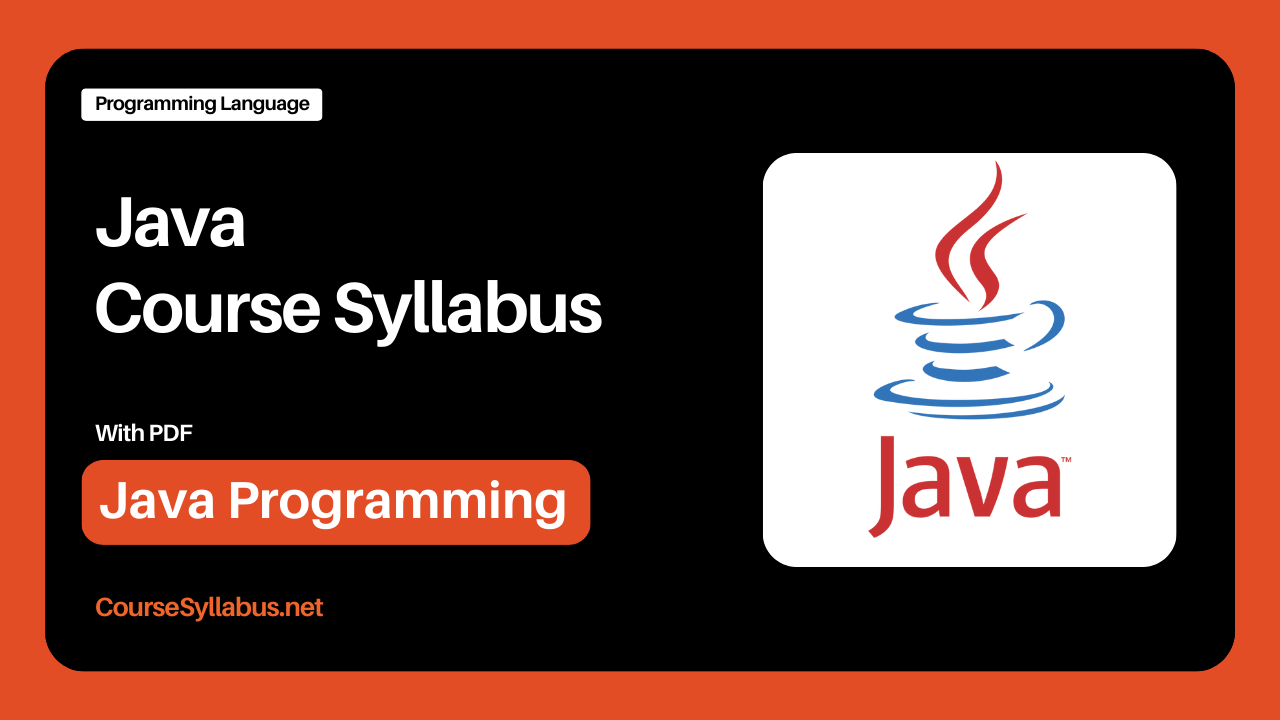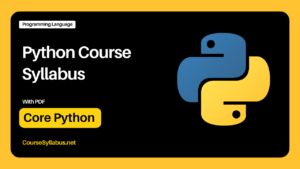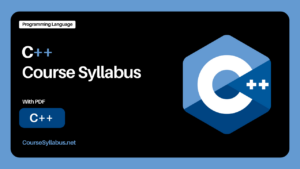Java is a high-level, object-oriented programming language developed by Sun Microsystems (now owned by Oracle Corporation) in the mid-1990s. It was designed with the intention of creating a platform-independent language that could run on any device or operating system without needing to be recompiled. Since its inception, Java has become one of the most popular and widely used programming languages in the world.
Java Course Syllabus
Module 1: Introduction to Java Programming
- History and Overview of Java
- Installing JDK (Java Development Kit) and IDE (Integrated Development Environment)
- Writing and Running Your First Java Program
- Understanding Java Syntax and Structure
- Primitive Data Types and Variables
- Operators and Expressions
- Control Flow Statements (if, else, switch)
- Introduction to Java Comments and Documentation
Module 2: Object-Oriented Programming in Java
- Understanding Object-Oriented Programming (OOP) Concepts
- Classes and Objects
- Constructors and Methods
- Encapsulation: Access Modifiers and Encapsulation Techniques
- Inheritance and Polymorphism
- Method Overriding and Overloading
- Abstract Classes and Interfaces
- Understanding the ‘this’ keyword and ‘super’ keyword
Module 3: Exception Handling
- Understanding Exceptions and Error Handling
- Types of Exceptions in Java
- Handling Exceptions using try-catch blocks
- Multiple Catch Blocks and Nested try-catch
- The finally block and Resource Management
- Custom Exception Classes and Throw Statement
Module 4: Collections Framework
- Introduction to Collections Framework
- Understanding Lists (ArrayList, LinkedList), Sets (HashSet, TreeSet), and Maps (HashMap, TreeMap)
- Iteration through Collections: Iterator, ListIterator
- Sorting and Searching Collections
- Introduction to Generics and Parameterized Types
- Collections Utility Methods
Module 5: File Handling
- Introduction to File Handling in Java
- Reading and Writing Text Files using FileReader, FileWriter, BufferedReader, BufferedWriter
- Working with Binary Files using FileInputStream, FileOutputStream
- Object Serialization and Deserialization
Module 6: Multithreading
- Introduction to Multithreading
- Creating Threads: Thread class and Runnable interface
- Thread Synchronization and Locks
- Deadlock Avoidance and Thread Communication
- Executors and Thread Pools
- Concurrent Collections and Synchronization Utilities
Module 7: GUI Programming with Swing
- Introduction to GUI Programming with Swing
- Swing Components: JFrame, JPanel, JButton, JLabel, JTextField, JTextArea, JCheckBox, JRadioButton, etc.
- Layout Management: FlowLayout, BorderLayout, GridLayout, BoxLayout
- Event Handling in Swing: ActionListener, ItemListener, MouseListener, etc.
- Customizing Look and Feel
- Introduction to JavaFX (Optional)
Module 8: JDBC (Java Database Connectivity)
- Introduction to JDBC and Database Drivers
- Establishing Database Connection
- Executing SQL Queries: Statement, PreparedStatement, CallableStatement
- Processing ResultSet
- Handling Transactions and Batch Processing
Module 9: Networking (Optional)
- Introduction to Networking in Java
- Working with URLs and HttpURLConnection
- Socket Programming: Client-Server Communication
- Remote Method Invocation (RMI)
Module 10: Project
- Capstone Project to apply learned concepts in a real-world scenario
- Design and Develop a Java application from scratch
- Implementation, Testing, and Documentation
Java Key Point
- Platform Independence: Java programs run on any device or operating system due to its bytecode compilation and execution on Java Virtual Machine (JVM).
- Object-Oriented: Java follows object-oriented principles, promoting modular and reusable code through encapsulation, inheritance, and polymorphism.
- Simplicity and Familiarity: Java syntax is straightforward and resembles C and C++, making it easy for developers to learn and use.
- Robustness and Reliability: With features like automatic memory management and exception handling, Java ensures stable and secure code execution.
- Rich Standard Library: Java offers a vast standard library (Java API) for common tasks, reducing development time and effort.
- Multi-threading Support: Built-in support for multithreading enables the creation of high-performance and scalable applications.
- Wide Range of Applications: Java is versatile, powering applications in web development, mobile development (Android), enterprise systems, and more.
- Active Community and Ecosystem: Java benefits from a large and active developer community, contributing to an extensive ecosystem of libraries, frameworks, and tools.
Java Learning Resources
There are many resources available for learning JAVA, ranging from online tutorials and courses to books and interactive platforms. Here are some popular options:
Time for Learning Java
- For complete beginners, it may take 3 to 6 months to grasp basic concepts and syntax.
- Those with programming experience might learn Java basics in 1 to 3 months.
- Advanced learners could become proficient in Java within 1 to 2 months with intensive study.
Java Developer Career Opportunities
- Software Developer/Engineer: Develop software applications, ranging from web and mobile apps to enterprise systems, using Java.
- Java Developer: Specialize in Java programming, working on projects that require Java expertise across various domains.
- Web Developer: Build dynamic and interactive web applications using Java frameworks like Spring, Hibernate, and Apache Struts.
- Android Developer: Develop mobile applications for Android devices using Java or Kotlin, the official programming languages for Android development.
- Systems Architect: Design and implement complex systems and software architectures using Java technologies to meet business requirements.
- Enterprise Application Developer: Work on developing and maintaining large-scale enterprise applications using Java Enterprise Edition (Java EE) technologies.
- Software Engineer in Test: Develop automated test scripts and frameworks for Java-based applications to ensure software quality and reliability.
- DevOps Engineer: Utilize Java tools and frameworks for automation, continuous integration, and deployment in DevOps processes.
- Big Data Developer: Work with Java-based big data technologies like Apache Hadoop, Apache Spark, and Apache Kafka to process and analyze large datasets.
- Cloud Developer: Develop cloud-based applications using Java and related technologies for platforms like Amazon Web Services (AWS), Microsoft Azure, and Google Cloud Platform.
Conclusion:
In summary, Java offers a multitude of career prospects in software development and related fields. Its versatility, widespread use, and robustness make it a valuable skill. Mastering Java can pave the way for a rewarding career with ample opportunities for growth and innovation.




